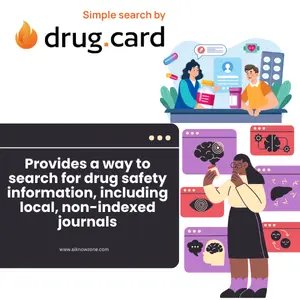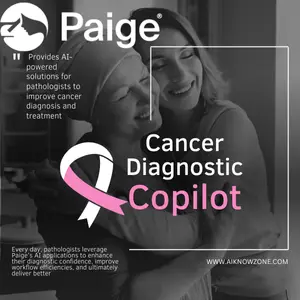DrugCard Simple Search
Discover how DrugCard Simple Search leverages AI to revolutionize drug safety monitoring and literature screening for the pharmaceutical industry.
Description
DrugCard Simple Search Review: Is This AI Tool a Game Changer?
Alright, let’s dive into DrugCard Simple Search, a tool that’s been buzzing in the pharmaceutical industry for its promise to streamline drug safety monitoring. If you’re like me, wading through endless piles of local medical literature is *not* your idea of a fun afternoon. 😩 DrugCard Simple Search claims to use AI to not only access local journals in over 100 languages but also to generate AI-powered abstracts in seconds, mimicking the functionality of PubMed but with a focus on local, often overlooked sources. The tool aims to significantly reduce the time spent on literature screening, freeing up valuable time for drug safety specialists to focus on, well, actual drug safety. This is a huge deal in a world where regulatory compliance is paramount and the early detection of adverse events can literally save lives. DrugCard Simple Search positions itself as a solution to improve the efficiency and predictability of the MLM (Medical Literature Monitoring) process for pharmaceutical companies, helping them stay ahead of the curve. The claim of cutting screening time by up to 70% immediately piqued my interest! Let’s see if it lives up to the hype. 😉
Key Features and Benefits of DrugCard Simple Search
DrugCard Simple Search isn’t just another search engine; it’s tailored specifically for drug safety and pharmacovigilance. Here’s a breakdown of its key features and how they benefit users:
- AI-Powered Local Literature Screening: DrugCard Simple Search continuously screens local medical literature from various countries and languages, ensuring you don’t miss critical safety information buried in regional journals. This feature directly addresses the challenges of language barriers and the sheer volume of information.
- AI-Generated Abstracts: Get quick summaries of relevant articles, saving you time and effort in determining if an article is pertinent to your research. This is especially helpful when dealing with languages you may not be fluent in. The AI-generated abstracts provide a quick overview of the context.
- Adverse Event Database: Access a database of adverse events extracted from local literature, allowing for proactive risk evaluation and signal detection. This feature enables PV teams to identify more drug safety information, reveal new safety signals, and proactively evaluate the risk of adverse reactions.
- Automated Alerts and Reporting: Receive instant notifications when new drug mentions are found in local journals, along with weekly summary reports to simplify audits and regulatory inspections. Stay informed about new developments.
- Compliance and Traceability: DrugCard centralizes digital records, ensuring data is attributable, legible, original, enduring, and accurate, which is essential for regulatory compliance. This ensures that all data meets regulatory requirements, a critical aspect of pharmacovigilance.
How It Works (Simplified)
Using DrugCard Simple Search seems pretty straightforward. First, you create an account and specify the drugs or products you want to monitor. Then, the AI engine continuously scans local journals in your selected regions and languages. When a relevant article is found, you’ll receive an instant notification and an AI-generated abstract. You can then review the abstract to determine if the full article is relevant. If it is, you can access the original source or save the information for later use. The platform also provides weekly summary reports, making it easy to track trends and stay on top of potential safety issues. This simplified approach allows for efficient monitoring of local literature, improving the overall workflow of pharmacovigilance teams. And that’s a win in my book! 🎉
Real-World Use Cases for DrugCard Simple Search
Here are some practical scenarios where DrugCard Simple Search can be a game-changer:
- Local Market Entry: I once worked on a project launching a new drug in several CIS countries. The local literature screening process was a nightmare, involving multiple vendors and manual translations. DrugCard Simple Search could have significantly streamlined this process, providing real-time insights and reducing the risk of missing critical safety information.
- Post-Market Surveillance: Imagine you’re responsible for monitoring the safety of a drug in a region with a complex regulatory landscape. DrugCard Simple Search can continuously scan local journals for adverse event reports, helping you identify potential safety signals and proactively address any emerging issues.
- Competitor Monitoring: Stay informed about competitor products and their safety profiles by monitoring local literature for mentions of their drugs. DrugCard Simple Search can provide valuable competitive intelligence, helping you make informed decisions and maintain a competitive edge.
- Regulatory Compliance: Ensure compliance with local regulations by using DrugCard Simple Search to monitor literature for required safety information. The platform’s automated alerts and reporting features can help you stay on top of regulatory changes and avoid costly penalties.
Pros of DrugCard Simple Search
- Significant Time Savings: Automated literature screening reduces manual effort and accelerates the identification of relevant information.
- Enhanced Accuracy: AI-powered insights minimize the risk of human error and improve the accuracy of safety monitoring.
- Improved Compliance: Centralized data and automated reporting simplify regulatory compliance and reduce the risk of penalties.
- Broad Language Support: Access local literature in over 100 languages, breaking down language barriers and improving global safety monitoring.
Cons of using DrugCard Simple Search
- AI Dependency: Reliance on AI-generated abstracts may require occasional verification of the original source to ensure accuracy and context.
- Potential for False Positives: The AI may occasionally flag irrelevant articles, requiring manual review and filtering.
- Learning Curve: While the platform is generally user-friendly, some users may require time to fully understand and utilize all features.
- Limited Customization: The level of customization may be limited compared to more complex, enterprise-level pharmacovigilance systems.
DrugCard Simple Search Pricing
Unfortunately, specific pricing details weren’t readily available in the provided search snippets. It’s best to visit the DrugCard website or contact their sales team directly for the most up-to-date pricing information. Pricing models often vary depending on the number of drugs monitored, regions covered, and level of support required. 💰
Conclusion
In conclusion, DrugCard Simple Search appears to be a valuable tool for pharmaceutical companies, CROs, and independent professionals seeking to streamline drug safety monitoring and improve regulatory compliance. Its AI-powered features, broad language support, and automated reporting can save significant time and effort. If you’re tired of manually sifting through endless piles of local literature, DrugCard Simple Search is definitely worth exploring. It’s particularly well-suited for small to medium-sized companies or teams looking for a cost-effective solution to enhance their pharmacovigilance capabilities. However, remember to weigh the potential limitations and verify the accuracy of AI-generated abstracts when making critical decisions. Overall, I’d say DrugCard Simple Search is a promising tool with the potential to revolutionize the way drug safety is monitored in the pharmaceutical industry. 👍




Reviews
There are no reviews yet.